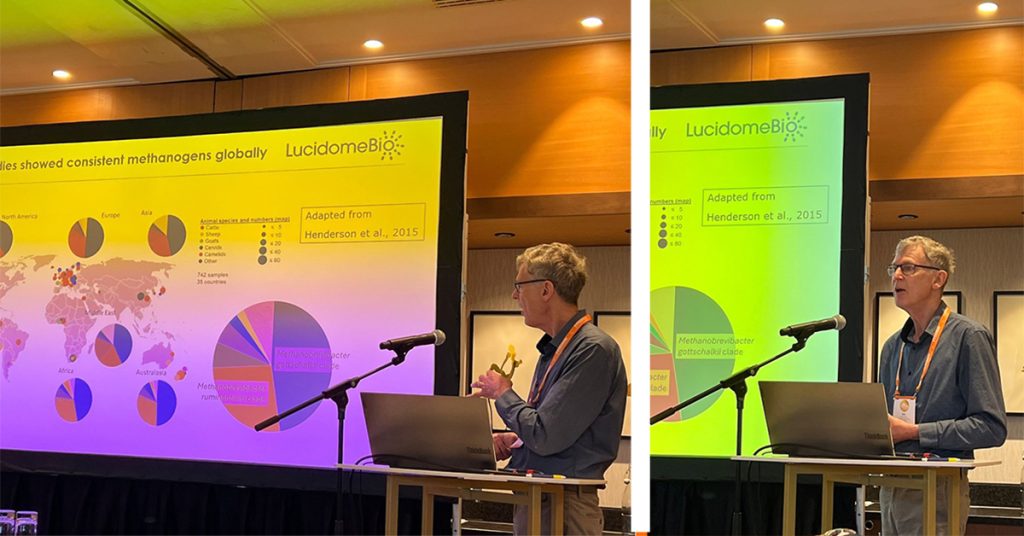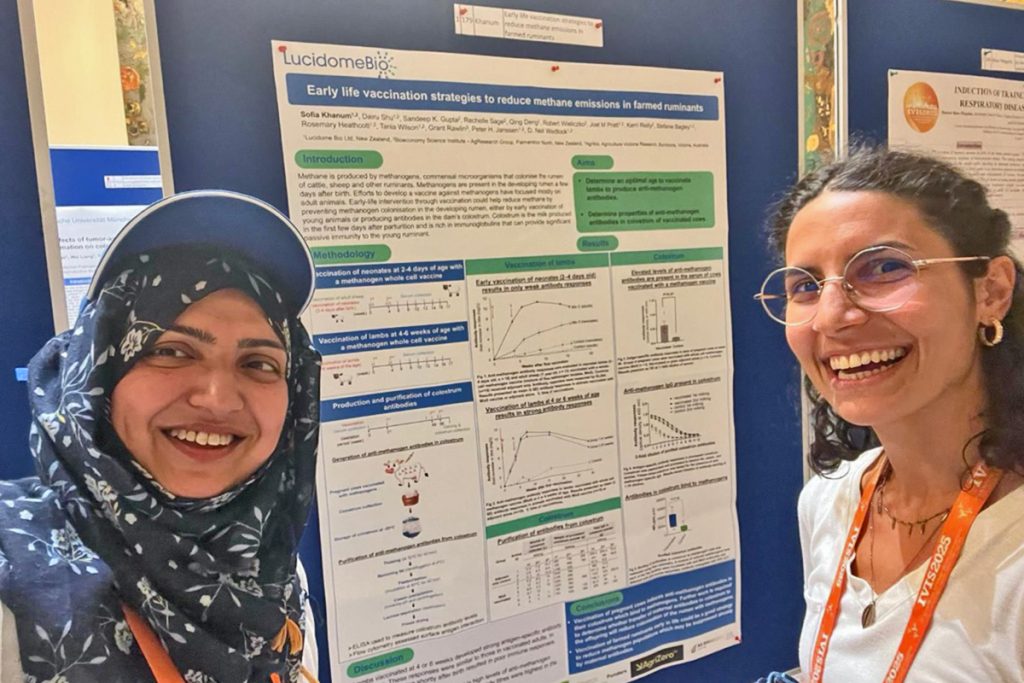Shortening the path from lab to field: Lucidome Bio brings methane vaccine research to IVIS 2025
The International Veterinary Immunology Symposium (IVIS 2025), held in Vienna last month, brought together global researchers exploring the next frontiers in animal health. Lucidome Bio was proud to be represented by Dr Neil Wedlock and Dr Sofia Khanum, both of whom showcased progress toward a methane-reducing vaccine for livestock.
Big-picture drivers are shaping the field

In his presentation ‘The challenges and progress in target selection for a methanogen vaccine’, Dr Neil Wedlock reminded delegates that livestock methane is not a side issue – it is one of the biggest climate challenges facing agriculture today.
He said that ruminant methane emissions account for around 5% of total global greenhouse gases and that reducing these emissions is “The fastest lever we have to slow warming in the next 25 years.” What’s more, the ‘big picture’ drivers are now very real: climate pressure and food chain resilience are converging to raise the urgency around a viable solution.
Science and technology are accelerating discovery
Dr Wedlock’s talk outlined how cutting-edge immunology and molecular tools are transforming vaccine development. Fittingly, advances showcased at the event – such as single-cell RNA sequencing, antigen discovery pipelines and precision immunology – further highlighted how tech is giving scientists the ability to identify and validate vaccine targets at unprecedented resolution.
He described how understanding immune responses to parasites and microbes at the single cell level allows researchers to design more effective immunotherapies and vaccines. “What was once exploratory is now becoming standard practice,” he said, referring to the opportunities to accelerate discovery and shorten the path from lab to field.
Breakthroughs in methanogen vaccine research are happening at pace
Dr Wedlock and Dr Khanum also shared progress from Lucidome Bio’s own programme with delegates, including:
- Demonstrating that methanogen populations are globally consistent – meaning a single vaccine has worldwide applicability.
- Showing that vaccination can induce high levels of antibodies in saliva – sufficient to coat methanogens in the rumen.
- Proving that antibodies remain active long enough to be effective.
- Identifying protein targets on methanogen surfaces that can be precisely bound by antibodies.
“These advances give us real confidence that a safe, effective and affordable methane vaccine is achievable in the near future,” Dr Wedlock concluded.
Collaboration is key

Alongside the main sessions, Lucidome Bio’s Sofia Khanum presented her poster on ‘Early-life vaccination strategies to reduce methane emissions in farmed ruminants, receiving strong feedback: “It was reassuring to know we are on the right track and the suggestions I received will directly strengthen our next steps,” she commented.
The symposium also reinforced the importance of collaboration. Lucidome Bio is working with The Pirbright Institute and University of Melbourne and is engaged in conversations with the Royal Veterinary College. “No single organisation can crack this challenge alone; the future is collaborative,” said Dr Wedlock.
In parallel to the trip, Dr Khanum and Dr Wedlock attended a Global Methane Hub meeting and toured Pirbright Institute’s facilities alongside international peers, exemplifying how international networks are coming together to tackle methane and animal health in parallel.
Overall, IVIS 2025 highlighted Lucidome Bio’s growing role in the global conversation on livestock methane reduction. The message from Vienna was clear: the scientific, technological and collaborative momentum behind methane vaccines is accelerating and Lucidome Bio is at the forefront.
